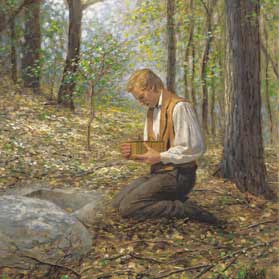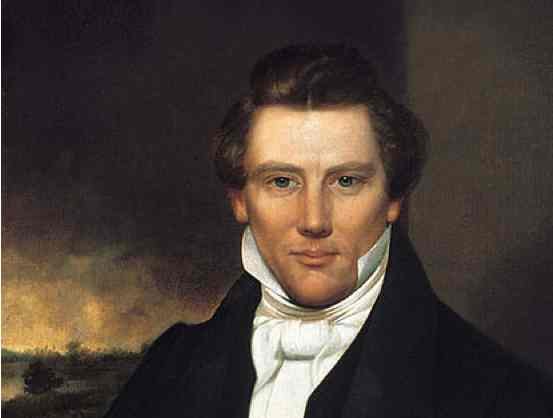Praise to the man who communed with Jehovah! Joseph Smith was the prophet of the restoration. He was told in a vision from the angel Moroni “that God had a work for me to do; and that my name should be had for good and evil among all nations, kindreds, and tongues, or that it should be both good and evil spoken of among all people.”
Millions of people worldwide, both members of The Church of Jesus Christ of Latter-day Saints and non-members alike, have come to know Brother Joseph again. Many revere him as a prophet, seer, and revelator, while others are critical of him and defame his name. Nevertheless, with all of the information that has been collected and published about his life, there are still some interesting factoids about the life of Joseph Smith that are rarely, if ever, mentioned. Here are some unusual facts about Joseph Smith that most people probably never knew.
Joseph Smith was born in Sharon, Vermont, the fifth of eleven children born to Joseph Smith, Sr. and Lucy Mack Smith on 23 December 1805. By 1817, Joseph and his family moved to the “burned-over district” of western New York, an area repeatedly swept by religious revivals during the Second Great Awakening. Views about organized religion differed among family members, but they did believe in visions and prophecies.
His mother described him as “much less inclined to the perusal of books than any of the rest of the children, but far more given to meditation and deep study.” Various people described Joseph as “remarkably quiet,” and “taciturn,” and “proverbially good-natured,” and “never known to laugh.” The first little-known fact about him is that according to one of his acquaintances in Palmyra, New York, O. Turner, Joseph had “a jovial, easy, don’t-care way about him,” and he had an aptitude for debating moral and political issues in a local junior debating club.
A second fact that many people may not be aware of concerns Joseph’s genealogy. Through his mother’s line, he is related to such well-known people as George W. Bush, Winston Churchill, Henry Wadsworth Longfellow, John P. Morgan, Mitt Romney, Richard Nixon, and David Marriott.
He met and fell in love with Emma Smith from Harmony Township, Susquehanna County, Pennsylvania, whom he married in 1827. Another trivia fact is that Emma refused to let Joseph in her garden because she believed that dozens of people would gather around to be near him, and they would trample all of the plants.
It appears that Joseph was also a pet lover and owned two dogs. Reports state that his favorite dog was named Major, and Sylvester Smith threatened to kill it while on Zion’s Camp march. He also had a bulldog named Baker.
What the angel Moroni told him in the vision that his “name should be had for good and evil among all nations, kindreds, and tongues” rang true in Hiram, Ohio. He was tarred and feathered there, and during the ordeal, he chipped a tooth causing him to speak with a slight whistle for the rest of his life.
How many people would ever think that such a great leader as Joseph Smith would have stage fright? One of the original twelve apostles in the early Church, Heber C. Kimball, reportedly often heard Joseph Smith say that his legs often “trembled like Belshazzar’s when he got up to speak before the world, and before the Saints.”
Unbeknownst to Joseph during his lifetime, several of the people whom he had a close association with such as Parley Pratt, Orson Pratt, Wilford Woodruff, and Harold B. Lee were his cousins. Brigham Young, the second President of The Church of Jesus Christ of Latter-day Saints from 1847 until his death in 1877, was his fifth cousin.
On 28 June 1830, in route to New York, Joseph was arrested and falsely accused by people purporting that he owed them money. He was given a hearing, found to be innocent, and subsequently released. Events such as this occurred six times in the course of one day, and in each instance, the charges were dropped. After the last hearing, Joseph returned to Kirtland.
Finally, a fact that some may already be aware of is that decoy caskets were used at Joseph and Hyrum’s funeral after the martyrdom in the Carthage jail in Carthage, Illinois. There was a $1,000 reward for the head of Joseph Smith, so the caskets were filled with sandbags to try and prevent the bodies from being desecrated. Later, the bodies of the two brothers were buried in secret. “In life they were not divided, and in death they were not separated!” (Doctrine and Covenants 135:3). The chorus of the LDS hymn Praise to the Man written by William W. Phelps is a fitting closing commentary on the life of Joseph Smith:
Hail to the Prophet, ascended to heaven!
Traitors and tyrants now fight him in vain.
Mingling with Gods, he can plan for his brethren;
Death cannot conquer the hero again.
** Information for this article was taken from the article titled “10 Rare Facts about the Prophet Joseph Smith” by Aleah Ingram posted on 29 May 2016 on LDS Daily.com.
About Keith L. Brown
Keith L. Brown is a convert to The Church of Jesus Christ of Latter-day Saints, having been born and raised Baptist. He was studying to be a Baptist minister at the time of his conversion to the LDS faith. He was baptized on 10 March 1998 in Reykjavik, Iceland while serving on active duty in the United States Navy in Keflavic, Iceland. He currently serves as the First Assistant to the High Priest Group for the Annapolis, Maryland Ward. He is a 30-year honorably retired United States Navy Veteran.



 Watch a video about the restoration of the gospel on lds.org
Watch a video about the restoration of the gospel on lds.org